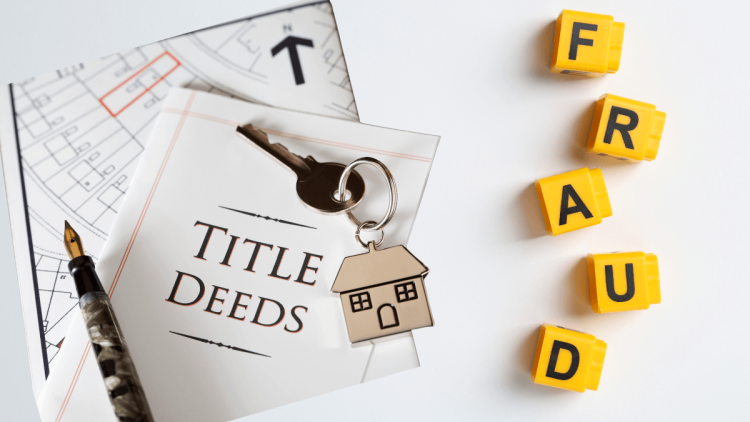What is Title Fraud and How to Prevent it
Title fraud, also known as home title theft or deed fraud, is a type of real estate fraud where criminals use a homeowner’s personal information to forge a deed and steal their property. There has been an alarming uptick in this version of fraud. This can lead to significant financial and legal issues for the homeowner, including foreclosure and credit damage. Here are some common methods used by criminals to commit title fraud:
- Phishing: Criminals pretend to be legitimate entities to obtain personal information from homeowners.
- Malware: Software installed on a homeowner’s computer to access personal information.
- Data Breaches: Accessing personal information from databases of companies or organizations.
- Unsecured Wi-Fi Networks: Using unsecured networks to steal personal information.
- Mail Theft: Stealing mail to obtain sensitive documents
Prevention Tips
To protect yourself from title fraud, consider the following steps:
- Monitor Your Property Records: Regularly check your property records at the county recorder’s office to ensure no unauthorized changes have been made.
- Secure Personal Information: Keep sensitive documents like deeds and mortgage statements in a safe place. Avoid sharing personal information online or through unsecured channels.
- Use Strong Passwords: Protect your online accounts with strong, unique passwords and enable two-factor authentication where possible.
- Secure Your Wi-Fi Network: Ensure your home Wi-Fi network is secured with a strong password and avoid using public Wi-Fi for sensitive transactions.
- Be Cautious with Emails and Calls: Be wary of unsolicited emails or calls asking for personal information. Verify the identity of the sender or caller before sharing any details.
- Consider Title Insurance: Some title insurance policies offer protection against title fraud. Check with your insurance provider to see if this is an option
What to do if you feel you are a victim
If you suspect that you are a victim of title fraud, it’s crucial to act quickly to minimize the damage and protect your property. Here are the steps you should take:
- Contact Law Enforcement:
- Report to Local Police: File a report with your local police department to document the fraud.
- FBI Internet Crime Complaint Center (IC3): Report the fraud online through the IC3 website.
- Notify Your County Recorder:
- Alert the County Recorder’s Office: Inform the county recorder or registrar of deeds where your property is located about the fraudulent activity. They can provide guidance on how to correct the records.
- Consult a Real Estate Attorney:
- Hire an Attorney: Seek legal advice from a real estate attorney who specializes in title fraud. They can help you navigate the legal process to reclaim your property and clear your title.
- Contact Your Title Insurance Provider:
- File a Claim: If you have title insurance, notify your provider immediately. They may offer coverage for legal expenses and assist in resolving the issue.
- Monitor Your Credit:
- Place Fraud Alerts: Contact the three major credit bureaus (Equifax, Experian, and TransUnion) to place fraud alerts on your credit reports. This can help prevent further fraudulent activity.
- Check Your Credit Reports: Regularly review your credit reports for any unauthorized accounts or activities. We suggest Credit Armor. It provides credit monitoring. However, it also provides its subscribers with fraud insurance up to $1 million and the Privacy Master which removes your data from hundreds of data brokers.
- Secure Your Personal Information:
- Change Passwords: Update passwords for your online accounts, especially those related to financial and personal information.
- Protect Sensitive Documents: Ensure that important documents, such as deeds and mortgage statements, are stored securely.
- Consider Title Monitoring Services:
- Enroll in Monitoring Services: Some counties offer free or paid services that alert you to any changes in your property records. These services can help you detect fraudulent activity early .
Taking these steps promptly can help you mitigate the impact of title fraud and protect your property.
Title fraud can be difficult to detect, but there are several warning signs that may indicate you are a victim. Here are some common signs to watch for:
Unexpected Bills or Statements:
- Receiving bills or statements for a mortgage or home equity loan you did not apply for can be a red flag
Unfamiliar Documents:
- Finding documents in your name for properties you do not own or recognizing unfamiliar names on your property records can indicate fraudulent activity
Changes in Property Records:
- Regularly check your property records at the county recorder’s office. Any unauthorized changes, such as a new deed or mortgage, should be investigated immediately
Missing Bills or Statements:
- If you stop receiving your regular mortgage statements or property tax bills, it could be a sign that your address has been changed without your knowledge
Notices of Foreclosure or Default:
- Receiving notices of foreclosure or default on a loan you did not take out is a serious indicator of title fraud
Unexplained Changes in Your Credit Report:
- Regularly monitor your credit report for any new accounts or inquiries that you did not initiate. This can help you catch fraudulent activity early
Tenants or Buyers Contacting You:
- If people contact you about renting or buying your property, and you have not listed it for sale or rent, it could be a sign that someone else is posing as the owner
Legal Notices:
- Receiving legal notices about your property, such as eviction notices or lawsuits, can indicate that someone else is claiming ownership
If you notice any of these signs, it’s important to take immediate action to protect your property and identity.

